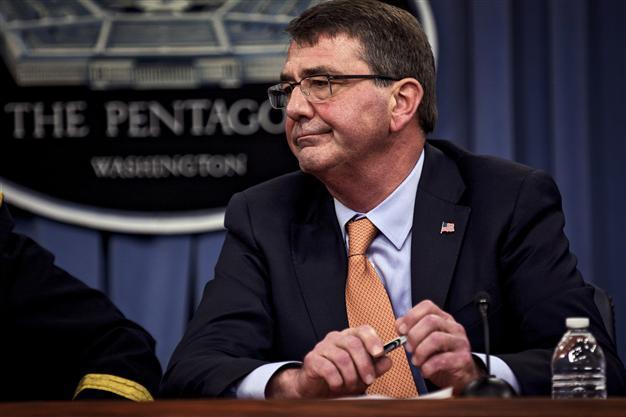Carter concerned Iran ships may carry arms for Yemen rebels
MOFFETT FIELD, California - The Associated Press

REUTERS Photo
Defense Secretary Ash Carter said April 22he is concerned that Iranian ships heading toward Yemen may be carrying advanced weapons for the Houthi rebels, and moving a U.S. aircraft carrier to the region gives the president options.
Making his first public remarks on the Iranian cargo ships, Carter told reporters traveling with him that he is not prepared to say whether the U.S. would be willing to forcibly stop and board one of the Iranian ships if it tries to cross into Yemen.
"We have options," he said when asked about the boardings. "We're not at that point. We're at the point of trying to get the parties back to the table."
Still, he said the U.S. is making it clear to Iran that "obviously fanning the flames or contributing to it by any party is not welcome to us."
The aircraft carrier USS Theodore Roosevelt is moving into the waters off Yemen, joining eight other U.S. warships, including some carrying teams capable of boarding and searching other vessels. The move comes amid reports that nine Iranian ships are heading that way, possibly carrying arms for the Shiite Houthi rebels. Such shipments would be in violation of a U.N. Security Council resolution.
U.S. officials have repeatedly said the carrier's deployment this week was in response to the deteriorating situation in Yemen, and its primary mission will be to insure freedom of navigation and commerce.
The move, however, came just as Saudi Arabia declared an end to the first phase of its campaign of airstrikes against the Iranian-backed Houthis and their allies in Yemen. Saudi Arabia has been concerned about the possibility that more arms could be flowing to the Houthis, and the presence of the carrier and other U.S. warships provide added deterrence for weapons deliveries.
Saudi Arabia-led airstrikes continued April 22, signaling that while the military action may be scaled back, it would not be halted.
Carter said the U.S. "would like to see the parties get back to a political settlement and get the country back to a decent level of governance." He spoke en route to California, where he is scheduled to give a speech at Stanford University and woo high-tech Silicon Valley companies to work with the Pentagon on securing emerging technologies that the military could use.
The Roosevelt also brings a strong command and control function that could help coordinate any efforts by the other U.S. Navy ships off Yemen. Carriers don't routinely carry search and seizure teams, and generally would play no role in any interdiction, other than to be a strong show of U.S. military might.
"Right now, their ships are in international waters," President Barack Obama said April 21 in an MSNBC interview. "What we've said to them is that if there are weapons delivered to factions within Yemen that could threaten navigation, that's a problem. And we're not sending them obscure messages - we send them very direct messages about it."
Saudi Arabia and several of its allies, mainly Gulf Arab countries, have been trying to drive back the rebels, who seized the capital of Sanaa in September and have overrun many other northern provinces with the help of security forces loyal to former President Ali Abdullah Saleh. The U.S. supported the Saudi airstrike campaign, which will evolve into a new drive to push the rebels out.
Western governments and Sunni Arab countries say the Houthis get their arms from Iran. Tehran and the rebels deny that, although the Islamic Republic has provided political and humanitarian support to the Shiite group.
